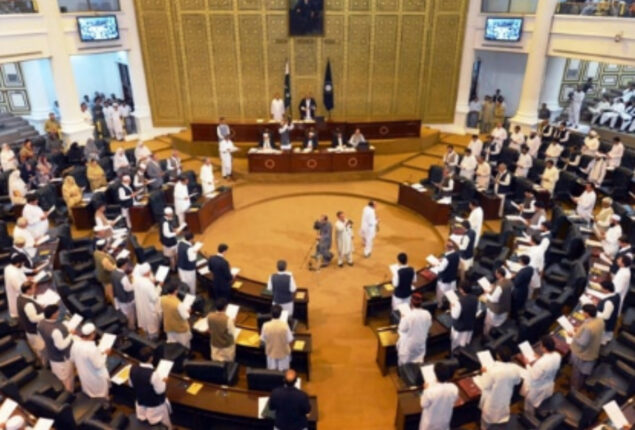
Discussion held on KPK peace and security
ISLAMABAD: The Islamabad Policy Research Institute (IPRI) in collaboration with the South Korean Embassy held a seminar to discuss the “Challenges to peace and security in Khyber Pakhtunkhwa (KPK) and tribal districts”, a statement said.
South Korea Ambassador Suh Sangpyo said that his country is eager to see peace prospects flourish in Pakistan. Korean companies are very much interested in investing in it, he added.
Durable peace in the settled and tribal areas is a must for broad-based serenity in Afghanistan, Sangpyo remarked.
Former National Security advisers Dr Moeed Yusuf and General Naseer Khan Janjua (Retd) along with IPRI Director Research Dr Rasshid Wali Janjua addressed the session.
Dr Moeed said that increasing concerns in the context of peace and security are of vital importance, and the same are in need of being addressed in a holistic manner. While Pakistan has chosen the route of geo-economics, peace within Pakistan and in the region is the key factor, he added.
While speaking about the Northwest corridor, the former NSA said that fissures are evident. “The environment around us is not in our control, and the fact of the matter is that we have a neighbour on our East which is negative to us and the Western frontier is troubled.”
China is Pakistan’s only achievement in terms of ensuring cordiality in the region. The ongoing unrest in KPK is borne out of a fallout from Afghanistan, and as far as counter terrorism is concerned, Pakistan has a great track record, Dr Moeed noted.
He was of the view that sporadic attacks are an enigma and ending terrorism is far beyond the security forces domain, as it entails a political solution.
The speakers while spelling out the dynamics of talks with Tehreek-e-Taliban Pakistan (TTP) and its counterpart in Afghanistan said that they represent two different notions, and it is wrong to equate them as a singular entity.
The TTP is putting up a fight against legitimate elected governments, where the Tehreek-e-Taliban Afghanistan has been busy against an occupation force.
There is no such thing as blanket amnesty, and no bargains from the TTP to go against the constitution of Pakistan such as reviving the tribal belt, Federal Administered Tribal Areas (FATA), or downgrading security forces presence will be accepted. “There is no underhand deal with the TTP and such an impression is wrong,” Dr Moeed remarked.
During the session, it was also noted that there is no possibility of resurgence of terrorism like in the past, and the State of Pakistan’s strength is incomparable to what it was 20 years ago.
The people of KPK are standing fast against terrorism, and no such attempts that were maneuvered in Swat in the early part of this century will be reenacted.
The participants talked about the porous border of 2,600 kilometers with Afghanistan, and said that still there are loopholes in its manning.
It was underscored that complete coordination is a must among various organs of the state, and an institutional check and balance approach is desired to fight out fissures and upheavals in the KPK.
The state suffers from elite capture, and the need of the hour while fighting terror outfits and unscrupulous elements is to maximise cooperation with the locals by empowering them in decision-making. This is how the onus will move on to public space.
Former NSA General Naseer Khan Janjua (Retd) said that the TTP is a defeatist body, and all its work is to somehow align with other non-state players to attract attention, and bargain a deal.
He opposed any bargaining with the TTP and said that the state must reassert its writ.
While talking about two superpowers’ involvement in southwest Asia, Janjua said the fact that Afghanistan and Pakistan survive as independent entities is a show of great resilience, and achievement. He called the war in Afghanistan as a dirty war, wherein Pakistan is in a fixation mode.
QAU Area Studies Centre In-charge Dr Sadia Suleiman; Former ambassador of Pakistan Ambassador Muhammad Ayaz Wazir (Retd); KPK Additional IGP Operations Mohammad Ali Babakhel;, former Governor Balochistan and KP Owais Ahmed Ghani; Major Gen Inam-ul Haq (Retd); and former Secretary Defence Production Lt Gen Dr Muhammad Zahid Latif (Retd) spelt out their expertise.
Read More News On
Catch all the Business News, Breaking News Event and Latest News Updates on The BOL News
Download The BOL News App to get the Daily News Update & Follow us on Google News.




